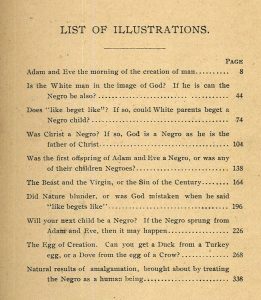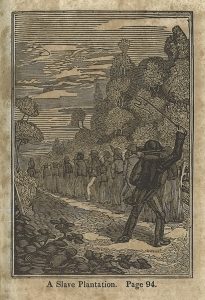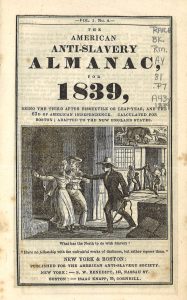- The University of Alabama Libraries
- Libraries
- Special Collections
- Research Portals
- Slavery, Abolition and Emancipation
- Public Conversation
Public Conversation
Our published collections contain many examples of works that were part of the discourse about slavery and abolition in the United States, from political and moral arguments on the issue to pictorial and narrative descriptions of the institution and its legacy in the late 19th century.
Though many of these works would have been considered secondary sources at the time they were published, their age makes them perhaps more useful as primary sources — that is, as the focus of analysis themselves, rather than as informational sources. Other examples, such as personal, opinion-based genres like speeches and correspondence, were always primary sources, not substantially different from their unpublished counterparts.
All published items held by Special Collections can be found through Scout, our federated search interface. Here are some search strategies for finding materials pertaining to slavery in these online catalogs:
- Use the location limiter to pinpoint materials from Special Collections.
- Use the date range limiter to zero in on a particular period. Consider using key dates as boundaries.
- Try searching for keywords in the title field, such as slave, slavery, abolition, and emancipation.
- Try searching for these subject headings (Advanced Search):
- For general information about slavery, the slave trade, and the plight of slaves:
- Slavery — United States
- Slave Trade — United States
- Slaves — Social conditions
- For defenses of slavery: Slavery — Justification
- For abolitionist perspectives: Antislavery movements — United States
- For materials reflecting both sides of the slavery debate and all the gray areas in between: Slavery — United States — Controversial literature
- For emancipation and the plight of ex-slaves:
- Slaves — Emancipation — United States
- Freedmen — United States
- Freedmen — Southern States
- Freedmen — [State]
- For Reconstruction: Reconstruction (U.S. history, 1865-1877)
- For general information about slavery, the slave trade, and the plight of slaves:
Note: Though the sources below have been sorted into pro-slavery and anti-slavery sections, as well as into arguments by type, in reality categorization is usually not that straightforward. Some writers use multiple arguments to support or oppose slavery, and sometimes these are entangled with one another. For example, the Bible was often used as evidence in science-focused arguments. Many also make arguments that may not be purely for or against a particular stance — people held complex, sometimes self-contradictory views, so the ends and means of their arguments do not always add up in our modern estimation. For example, some abolitionists believed that blacks were inferior to whites and questioned their ability to survive in freedom.
Debates about Slavery
1. Prominent Voices
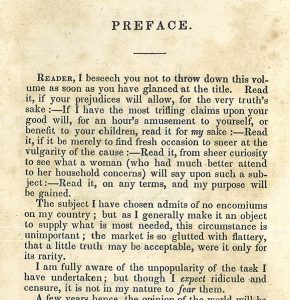
Many writers and speakers, from politicians and clergymen to authors and social reformers, rose to national prominence due to their vocal support for or resistance to the institution of slavery. For those for which we have published volumes, examples are given below.
Opposition
Bourne, George. A Condensed Anti-Slavery Bible Argument; By a Citizen of Virginia. New York: S. W. Benedict, 1845. [Wade Hall Book Collection E449 .B77 1845]
- Bourne (1780-1845) was born in England and emigrated to Baltimore at the beginning of the 19th century. He was a Presbyterian clergyman who became an abolitionist when he read in the church’s catechism the prohibition against “man-stealing.” He began his ministry in Virginia but eventually moved to the northeast and to Canada. In addition to writing abolitionist works and helping found the American Anti-Slavery Society, he was also an anti-Catholic propagandist. (source)
Child, Lydia Maria Francis. An Appeal in Favor of That Class of Americans Called Africans. New York: J. S. Taylor, 1836. [Rare Book Collection E449 .C532]
- Child (1802-1880) was born in Massachusetts. An ardent abolitionist, she served for a time as editor of the American Anti-Slavery Society newspaper National Anti-Slavery Standard, although she parted ways with the publication because of the organization’s tolerance of violence. A novelist and political writer, in 1861 she edited Harriet Jacobs’s slave narrative Incidents in the Life of a Slave Girl. She was also interested in other types of social reform, including Native American rights and women’s rights. (source)
Phillips, Wendell. Can Abolitionists Vote or Take Office under the United States Constitution?. New York: American Anti-Slavery Society, 1845. [Wade Hall Book Collection E449 .P3 1845]
- Phillips (1811-1884) was born in Boston. He married Ann Terry Greene, a radical abolitionist and friend of William Lloyd Garrison, and thereafter committed himself to the cause. In this work, he argued that the U.S. Constitution was an inherently pro-slavery document, so abolitionists cannot be involved in politics without being implicated in slavery. Especially famous for his oratory, he supported John Brown and urged citizens to resist the fugitive slave law. The Phillipses were also women’s rights advocates. (source)
Weld, Theodore Dwight. The Bible Against Slavery; an Inquiry into the Patriarchal and Mosaic Systems on the Subject of Human Rights. New York: n.p., 183?. [Rare Book Collection E449 .W441]
- Weld (1803-1895) was born in Connecticut. He worked with social reformer Charles Grandison Finney, speaking on various subjects, including temperance, and he later became an important anti-slavery orator. After his voice gave out, he trained others to be traveling speakers, including his future wife, prominent abolitionist and women’s rights advocate Angelina Grimké, and her sister Sarah. (source)
Defense
Calhoun, John C. Speech of Mr. Calhoun, of South Carolina, on the Slavery Question: Delivered in the Senate of the United States, March 4, 1850. Washington, D.C.: Buell & Blanchard, 1850. [Rare Book Collection E423 .C155 1850]
- Calhoun (1782-1850) was born in South Carolina. He rose to national prominence as a politician, including as Secretary of War for James Monroe and Vice President under John Quincy Adams and Andrew Jackson. In the 1820s, as a U.S. Senator, he was heavily involved in the Nullification Crisis, a battle over the constitutionality of federal tarrifs that prefigured the sectionalism that led to Civil War. As Secretary of State under John Tyler, he was instrumental in the annexation of Texas, a measure to help expand slavery. He wrote this speech opposing the Compromise of 1850 while a U.S. Representative; he was near death, so the speech was delivered by Senator James Mason. (source)
Fitzhugh, George. Cannibals All! or, Slaves without Masters. Richmond, Va.: A. Morris, 1857. [Rare Book Collection E449 .F555]
- Fitzhugh (1806-1881) was born in Virginia. He was a lawyer, though he did not care for the profession. He made many socioeconomic arguments in favor of slavery, including comparing the circumstances of the plantation system to the poor conditions of the factory worker in England or the experiences of workers in the North. In this work, he argues that slavery is the natural state of things and beneficial to both masters and slaves. (source)
Hammond, James Henry. Gov. Hammond’s Letters on Southern Slavery: Addressed to Thomas Clarkson, the English Abolitionist. Charleston, S.C.: Walker & Burke, 1845. [Rare Book Collection E449 .H22]
- Hammond (1807-1864) was born in South Carolina. He was editor of Southern Times during the Nullification Crisis, a sectional controversy in the 1820s, and later became a slaveowning plantation farmer. He was Governor of South Carolina in the 1840s and later served as a U.S. Senator, during which time he gave his famous “mud-sill” speech, which espoused the notion that society will always have a lower class to rest upon, like a mud sill or foundation. (source)
Yancey, William Lowndes. Address of the Democracy of Alabama to the National Democratic Convention, at Baltimore, June 18th, 1860.: n.p., 1860. [Alabama Collection E440.5 .A3 1860x]
- Yancey (1814-1863) was born in South Carolina. Though originally a unionist, he became a slaveowning plantation farmer in Alabama. In part due to disagreements with his stepfather, an active abolitionist, he began a political career as a states rights advocate and secessionist. This work deals with the walkout of the Alabama delegation of the National Democratic Convention in 1860, when that body refused to take up a platform upholding federal protection over property (i.e., including slaves). (source)
2. Political Arguments
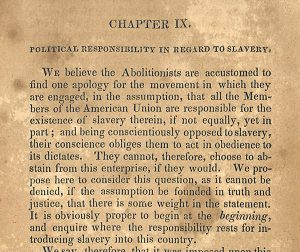
As enslaved people were considered property, the political discourse frequently revolved around whether the federal government had the right to limit a state’s self-government on matters of personal property. Other arguments stemmed from the reality that the economic system of the South, as it was, depended on the availability of cheap labor.
Opposition
Christy, David. Cotton Is King; Or, the Culture of Cotton, and Its Relation to Agriculture, Manufacturers and Commerce; to the Free Colored People; and to Those Who Hold That Slavery Is in Itself Sinful; By an American. Cincinnati, Ohio: Moore, Wilstach, Keys & Co., 1855. [Rare Book Collection E449 .C557]
Hamilton, John Church. The Slave Power: Its Heresies and Injuries to the American People, a Speech. Loyal Publication Society pamphlet no. 74. New York: J. A. Gray & Green, 1864. [Rare Book Collection E463 .L96 no.45-78]
Jay, William. A View of the Action of the Federal Government, in Behalf of Slavery. New York: J. S. Taylor, 1839. [Rare Book Collection E441 .J42]
Mann, Horace. Speech of Mr. Horace Mann, on the Right of Congress to Legislate for the Territories of the United States, and Its Duty to Exclude Slavery Therefrom; Delivered in the House of Representatives, in Committee of the Whole, June 30, 1848. Boston: W. B. Fowle, 1848. [Rare Book Collection E416 .M36 1848]
Nordhoff, Charles. America for Free Working Men: Mechanics, Farmers and Laborers Read How Slavery Injures the Free Working Man: The Slave-Labor System the Free Working-Man’s Worst Enemy. Loyal Publication Society pamphlet no. 80. New York: Loyal Society of New York, 1865. [Rare Book Collection E463 .L96 no.79-89]
Quincy, Josiah. Address Illustrative of the Nature and Power of the Slave States, and the Duties of the Free States; Delivered at the Request of the inhabitants of the town of Quincy, Mass., on Thursday, June 5, 1856. Boston: Ticknor & Fields, 1856. [Rare Book Collection E451 .Q7]
Sumner, Charles. No Property in Man: Speech of Hon. Charles Sumner, on the Proposed Amendment of the Constitution Abolishing Slavery Through the United States. Loyal Publication Society pamphlet no. 51. New York: Loyal Society of New York, 1864. [Rare Book Collection E463 .L96 no.45-78]
Defense
Brookes, Iveson L. A Defence of the South Against the Reproaches and Incroachments of the North: In Which Slavery Is Shown to be an institution of God Intended to Form the Basis of the Best Social State and the Only Safeguard to the Permanence of a Republican Government. Hamburg, S.C.: Republican Office, 1850. [Rare Book Collection E416 .S42]
Campbell, John A. The Rights of the Slave States; By a Citizen of Alabama. Charleston, S.C.: Southern Rights Association, 1850. [Alabama Collection E449 .C35]
Colton, Calvin. Abolition a Sedition; By a Northern Man. Philadelphia: G. W. Donohue, 1839. [Rare Book Collection E449 .C72]
Colwell, Stephen. The South: A Letter From a Friend in the North; with Special Reference to the Effects of Disunion upon Slavery. Philadelphia: C. Sherman & Son, 1856. [Rare Book Collection E449 .C725]
Dowdell, James F. The Kansas Issue; Remarks of Hon. James F. Dowdell, of Alabama, in the House of Representatives, March 10, 1858, Advocating the Necessity of Additional Guarantees for the Protection of Southern Rights. Washington, D.C.: Congressional Globe Office, 1858. [Rare Book Collection F685 .D76]
Kingsley, Z. A Treatise on the Patriarchal, or Co-Operative, System of Society As It Exists in Some Governments, and Colonies in America, and in the United States, Under the Name of Slavery, with Its Necessity and Advantages. n.p., 1829. [Rare Book Collection E446 .K45 1829]
Shorter, Eli Sims. Speech of Hon. Eli S. Shorter, of Alabama, on the Massachusetts Personal Liberty Bill and the Constitutional Rights of the South. Washington, D.C.: Union Office, 1856. [Rucker Agee Collection E450 .S5 1856x]
In Conversation
Correspondence, Between the Hon. F. H. Elmore, one of the South Carolina Delegation in Congress, and James G. Birney, one of the Secretaries of the American Anti-Slavery Society. New York: American Anti-Slavery Society, 1838. [Rare Book Collection E449 .B6174]
Speeches of John C. Calhoun and Daniel Webster, in the Senate of the United States, on the Enforcing Bill. Boston: Beals, 1833. [Rare Book Collection E338 .C152 1833]
3. Moral Arguments
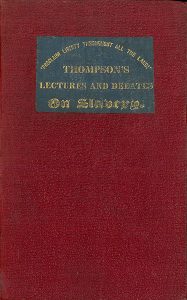
Whether derived from the Bible or Torah or from humanism, many arguments about slavery posited that Africans were inherently inferior, thus made for lowly work and better off under a master, unable to take care of themselves if freed. Some of these arguments took a historical tack, pointing out that slavery is an old institution. Others counter that chattel slavery is different than ancient practices or that arguing based on history is a fallacy.
Opposition
Broom, Walter William. An Englishman’s Thoughts on the Crimes of the South and the Recompence of the North. Loyal Publication Society pamphlet no. 84. New York: Loyal Society of New York, 1865. [Rare Book Collection E463 .L96 no.79-89]
Drisler, Henry. “Bible View of Slavery” by John H. Hopkins, D.D., Bishop of the Diocese of Vermont, Examined. Loyal Publication Society pamphlet no. 39. New York: C. C. Westcott, 1863. [Rare Book Collection E463 .L96 no.1-44]
French, Austa Malinda. Slavery in South Carolina and the Ex-Slaves; Or, the Port Royal Mission. New York: W. M. French, 1862. [Rare Book Collection E185.93.S7 F8]
Johnson, Evan M. “The Communion of Saints”: A Discourse Delivered in St. Michael’s Church, Brooklyn, N.Y., on Sunday, the 26th of March, A.D. 1848. Brooklyn, N.Y.: I. Van Anden, 1848. [Rare Book Collection BR55 .J532 1848]
M’Leod, Alexander. Negro Slavery Unjustifiable: A Discourse. New York: A. McLeod, 1863. [Rare Book Collection E446 .M17 1863]
Newman, Louis C. “Bible View of Slavery” Reconsidered: Letter to Rt. Rev. Bishop Hopkins. Loyal Publication Society pamphlet no. 39. New York: C. C. Westcott, 1863. [Rare Book Collection E463 .L96 no.1-44]
Rankin, John. Letters on American Slavery, Addressed to Mr. Thomas Rankin, Merchant at Middlebrook, Augusta County, Va. Newburyport, Mass.: Charles Whipple, 1836. [Rare Book Collection E449 .R212 1836]
Paxton, J. D. Letters on Slavery; Addressed to the Cumberland Congregation, Virginia. Lexington, Ky.: A. T. Skillman, 1833. [Rare Book Collection E449 .P34 1833]
Pillsbury, Parker. The Church As It Is, or, the Forlorn Hope of Slavery. Boston: A. Forbes, 1847. [Rare Book Collection E449 .P638 1847]
Simmons, George Frederick. Two Sermons on the Kind Treatment and on the Emancipation of Slaves. Preached at Mobile, on Sunday the 10th, and Sunday the 17th of May, 1840. Boston: W. Crosby, 1840. [Alabama Collection E449 .S59]
Sunderland, La Roy. The Testimony of God Against Slavery: A Collection of Passages From the Bible: Which Show the Sin of Holding and Treating the Human Species As Property: With Notes: To Which Is Added the Testimony of the Civilized World Against Slavery. Boston: I. Knapp, 1836. [Rare Book Collection E449 .S958]
Taylor, Thomas J. Essay on Slavery; As Connected with the Moral and Providential Government of God; and As an Element of Church organization. New York: n.p., 1851. [Rare Book Collection F449 .T246]
Thomson, Andrew. Slavery: Not Sanctioned, but Condemned, By Christianity: A Sermon. London: Ellerton & Henderson, 1829. [Rare Book Collection HT913 .T5x]
Thornwell, James Henley. National Sins: A Fast-Day Sermon: Preached in the Presbyterian Church, Columbia S.C., Wednesday, November 21, 1860. Columbia, S.C.: Southern Guardian, 1860. [Rare Book Collection BV4270 .T5x]
Treadwell, Seymour Broughton. American Liberties and American Slavery, Morally and Politically Illustrated. New York: J. S. Taylor, 1838. [Rare Book Collection E449 .T78 1838]
Defense
A Bible History of the Negro: Showing His Creation Prior to Adam; He Is a Separate and Distinct Species of the Human Family So Recognized by Their Creator from Adam’s Day to the Time of Our Saviour. Greenville Advocate, 1887. [Alabama Collection HT1589 .B5 1887x]
Armstrong, George D. The Christian Doctrine of Slavery. New York: C. Scribner, 1857. [Rare Book Collection E449 .A74 1857]
Brookes, Iveson L. A Defence of Southern Slavery: Against the Attacks of Henry Clay and Alex’r Campbell, in which Much of the False Philanthropy and Mawkish Sentimentalism of the Abolitionists Is Met and Refuted. Hamburg, S.C.: Robinson & Carlisle, 1851. [Rare Book Collection E449 .B875]
Estes, Matthew. A Defence of Negro Slavery, As It Exists in the United States. Montgomery, Ala.: Alabama Journal, 1846. [Rare Book Collection E449 .E79]
Ewart, David. A Scriptural View of the Moral Relations of African Slavery. Charleston, S.C.: Walker Evans, 1859. [Rare Book Collection HT915 .E9x 1859]
Hamilton, W. T. The Duties of Masters and Slaves Respectively, or, Domestic Servitude as Sanctioned by the Bible: A Discourse Delivered in the Government Street Church, Mobile, Ala. Mobile: F. H. Brooks, 1845. [Alabama Collection E449 .H215 1845a]
Manly, H. The South Vindicated From the Treason and Fanaticism of the Northern Abolitionists. Philadelphia: n.p., 1836. [Rare Book Collection E449 .S722]
Raphall, Morris J. Bible View of Slavery: A Discourse, Delivered at the Jewish Synagogue, Bnai Jeshurum, New York, on the Day of the National Fast, Jan. 4, 1861. New York: Rudd & Carleton, 1861. [Rare Book Collection E449 .R22]
Ross, Frederick Augustus. Slavery Ordained of God. Philadelphia: J. B. Lippincott & Co., 1857. [Alabama Collection F449 .R82]
Rush, Benjamin. An Address to the Inhabitants of the British Settlements in America, Upon Slave-Keeping. Philadelphia: J. Dunlap, 1773. [Rare Book Collection E446 .R96]
Smith, William A. Lectures on the Philosophy and Practice of Slavery, As Exhibited in the institution of Domestic Slavery in the United States; with the Duties of Masters and Slaves. Nashville: Stevenson & Evans, 1856. [Rare Book Collection E449 .S663]
Stiles, Joseph C. Modern Reform Examined; or, the Union of North and South on the Subject of Slavery. Philadelphia: J. B. Lippincott & Co., 1857. [Alabama Collection F449 .S85 1857x]
In Conversation
Domestic Slavery Considered As a Scriptural Institution: In a Correspondence Between the Rev. Richard Fuller of Beaufort, S. C., and the Rev. Francis Wayland, of Providence, R. I. New York: L. Colby, 1845. [Rare Book Collection E449 .F96]
Lectures of George Thompson, with a Full Report of the Discussion Between Mr. Thompson and Mr. Borthwick, the Pro-Slavery Agent, Held at the Royal Amphitheatre, Liverpool, Eng., and Which Continued for Six Evenings with Unabated Interest. Boston: I. Knapp, 1836. [Rare Book Collection E449 .T47]
4. Scientific Arguments
Scientific defenses of slavery, which we now label scientific racism, abounded in the mid-19th century, often tied to pseudo-scientific anthropological practices like craniometry and physiognomy. Many of the writers listed under Defense below believed in polygenism, the theory that the black and white races are separate and have different origins, perhaps even constitute different species; this is in opposition to the mainstream single-origin or monogenist theory espoused by scientists like Charles Darwin.
Opposition
Darwin, Charles. The Descent of Man, and Selection in Relation to Sex. New York: D. Appleton & Co., 1872. [Rare Book Collection QH365 .D2 1872 v.1-2]
Douglass, Frederick. The Claims of the Negro, Ethnologically Considered: An Address Before the Literary Societies of Western Reserve College, at Commencement, July 12, 1854. Rochester, N.Y.: Lee, Mann & Co., 1854. [Rare Book Collection E185 .A254 1854]
Defense
Bond, Thomas E. A Dissertation on the Varieties of Mankind: Being an Address Read Before the Cuvierian and Physiological Societies of Wesleyan University, August 2, 1843. Middletown, Conn.: The Societies, 1843. [Rare Book Collection GN325 .B6 1843]
Fitzhugh, George. Sociology for the South: Or, the Failure of Free Society. Richmond, Va.: A. Morris, 1854. [Rare Book Collection E449 .F556]
Gobineau, Arthur, comte de. The Moral and intellectual Diversity of Races, with Particular Reference to their Respective influence in the Civil and Political History of Mankind; From the French By Count A. De Gobineau: with an analytical Introduction and Copious Historical Notes. Philadelphia: J. B. Lippincott & Co., 1856. [Alabama Collection CB195 .G55]
Indigenous Races of the Earth; or, New Chapters of Ethnological Inquiry: Including Monographs on Special Departments of Philology, Iconography, Cranioscopy, Palaeontology, Pathology, Archaeology, Comparative Geography, and Natural History. Philadelphia: J. B. Lippincott & Co., 1857. [Rare Book Collection GN380 .N68 1857]
Morton, Samuel George. Crania Americana; Or, a Comparative View of the Skulls of Various Aboriginal Nations of North and South America. To Which Is Prefixed an Essay on the Varieties of the Human Species. Philadelphia: J. Dobson, 1839. [Rare Book Collection GN90 .M89]
Nott, Josiah Clark. An Essay on the Natural History of Mankind: Viewed in Connection with Negro Slavery: Delivered Before the Southern Rights Association, 14th December, 1850. Mobile, Ala.: Dade Thompson, 1851. [Alabama Collection E185 .N6]
—–. Two Lectures on the Connection Between the Biblical and Physical History of Man; Delivered By invitation From the Chair of Political Economy, Etc., of the Louisiana University, in December 1848. New York: Bartlett & Welford, 1849. [Alabama Collection GN356 .N91 1849]
—–. Types of Mankind: or, Ethnological Researches: Based Upon the ancient Monuments, Paintings, Sculptures, and Crania of Races, and Upon their Natural, Geographical, Philological and Biblical History. Philadelphia: J. B. Lippincott & Co., 1854. [Alabama Collection GN23 .N89 1854]
Van Evrie, John H. White Supremacy and Negro Subordination: or, Negroes a Subordinate Race, and (So-Called) Slavery Its Normal Condition; with an Appendix Showing the Past and Present Condition of the Countries South of U.S. New York: Van Evrie, Horton & Co., 1868. [Rare Book Collection E449 .V25 1868x]
Slavery Topics
5. The Institution
Many accounts of slavery and the slave trade were published in the early 19th century. Those that lean more toward description tend to focus on the horror of slavery and were written to advance the cause of abolition. Others, more historical in nature, tend to compare contemporary slavery to previous examples, often in defense of the institution. Among this list are also overviews of law relating to slavery.
Andrews, E. A. Slavery and the Domestic Slave-Trade in the United States, in a Series of Letters Addressed to the Executive Committee of the American Union for the Relief and Improvement of the Colored Race. Boston: Light & Stearns, 1836. [Rare Book Collection E449 .A56 1836]
Black Code: An Act Prescribing the Rules and Conduct to Be Observed with Respect to Negroes and Other Slaves of This Territory. New Orleans: Bradford & Anderson, 1806-1811. [Rare Book Collection KFL30 1806 .A2]
Blake, William O. 1857. The History of Slavery and the Slave Trade, Ancient and Modern. The Forms of Slavery that Prevailed in Ancient Nations, Particularly in Greece and Rome. The African Slave Trade and the Political History of Slavery in the United States. Columbus, Ohio: J. and H. Miller. [Wade Hall Book Collection HT861 .B55]
Bourne, George. Picture of Slavery in the United States of America. Boston: Isaac Knapp, 1838. [Rare Book Collection E449 .B773]
Condy, Thomas D. A Digest of the Laws of the United States & the State of South-Carolina Now of Force, Relating to the Militia: with An Appendix, Containing the Patrol Laws; the Laws of the Government of Slaves and Free Persons of Colour; the Decisions of the Constitutional Court and Court of Appeals of South-Carolina Therein; and An Abstract from the Rules and Regulations of the United States’ Army. Charleston, S.C.: A. E. Miller, 1830. [Rare Book Collection UB500 .C6]
Copley, Esther. A History of Slavery and Its Abolition. London: Henry G. Bohn, 1844. [Rare Book Collection HT975 .C64 1844]
Goodloe, Daniel R. The Southern Platform: Or, Manual of Southern Sentiment on the Subject of Slavery. Boston: J. P. Jewett & Co., 1858. [Rare Book Collection E449 .G652]
Greeley, Horace. A History of the Struggle for Slavery Extension or Restriction in the United States, from the Declaration of Independence to the Present Day. Mainly Compiled and Condensed from the Journals of Congress and Other Official Records, and Showing the Vote by Yeas and Nays on the Most Important Divisions in Either House. New York: Dix, Edwards, & Co., 1856. [Rare Book Collection E441 .G79]
Hildreth, Richard. Despotism in America: An Inquiry into the Nature, Results, and Legal Basis of the Slave-Holding System in the United States. Boston: J. P. Jewett & Co., 1854. [Rare Book Collection E449 .H641]
Horrors of American Slavery: Thrilling Narrative of a Slave Auction in the United States. Glasgow, Ky.: George Gallie, 1859. [Rare Book Collection E442 .H6x]
Mott, Abigail Field. Biographical Sketches and Interesting Anecdotes of Persons of Colour, to which Is Added, a Selection of Pieces in Poetry. New York: Estate of Lindley Murray, 1839. [Rare Book Collection E185.96 .M89]
Parker, Theodore. The Present Aspect of Slavery in America and the Immediate Duty of the North: A Speech Delivered in the Hall of the State House, Before the Massachusetts Anti-Slavery Convention, on Friday Night, January 29, 1858. Boston: B. Marsh, 1858. [Rare Book Collection E449 .P252]
Pollard, Edward Alfred. Black Diamonds Gathered in the Darkey Homes of the South. New York: Pudney & Russell, 1859. [Rare Book Collection E449 .P771]
Priest, Josiah. Slavery, As It Relates to the Negro, or African Race: Examined in the Light of Circumstances, History and the Holy Scriptures, with an Account of the Origin of the Black Man’s Color, Causes of His State of Servitude and Traces of His Character As Well in ancient As in Modern Times, with Strictures on Abolitionism. Albany, N.Y.: C. Van Benthuysen, 1843. [Wade Hall Book Collection E449 .P94 1843x]
Sawyer, George S. Southern Institutes; or, An Inquiry into the Origin and Early Prevalence of Slavery and the Slave-trade: With an Analysis of the Laws, History, and Government of the Institution in the Principal Nations, Ancient and Modern, from the Earliest Ages Down to the Present Time. Philadelphia, J. B. Lippincott & Co., 1858. [Wade Hall Book Collection E449 .S27]
Stroud, George M. A Sketch of the Laws Relating to Slavery in the Several States of the United States of America. Philadelphia: Kimber & Sharpless, 1827. [Rare Book Collection E441 .S92]
Torrey, Jesse. A Portraiture of Domestic Slavery, in the United States: With Reflections on the Practicability of Restoring the Moral Rights of the Slave, without Impairing the Legal Privileges of the Possessor. Philadelphia: John Bioren, 1817. [Rare Book Collection E446 .T69]
6. Abolitionist Groups
Anti-slavery societies and abolitionist groups were an important force for rallying people and resources around the cause of emancipation. They sometimes disagreed, however, on means (violence or pacifism), method (gradual or immediate), and ends (colonization or citizenship).
Address of the American Convention for Promoting the Abolition of Slavery and Improving the Condition of the African Race, Assembled at Philadelphia, in January, 1804, to the People of the United States. Philadelphia: S. W. Conrad, 1804. [Rare Book Collection E446 .A52 1804]
The American Anti-Slavery Almanac. Boston: Webster & Southard, 1837 and 1839. [Rare Book Collection AY81.P7 A43x 1837 / AY81.P7 A43x 1839
The Annual Report of the American & Foreign Anti-Slavery Society. New York: The Society, 1851. [Rare Book Collection E449 .A49 1851]
The Appeal of the Religious Society of Friends in Pennsylvania, New Jersey, Delaware, Etc.: To their Fellow-Citizens of the United States on Behalf of the Coloured Races. Philadelphia: Friend’s Book-store, 1858. [Rare Book Collection E449 .F9144 1858]
Report of the National Anti-Slavery Festival. Boston: The Managers, n.d. [Rare Book Collection E449 .N37x 1858]
Slavery and the Domestic Slave Trade, in the United States; By the Committee Appointed By the Late Yearly Meeting of Friends Held in Philadelphia, in 1839. Philadelphia: Merrihew & Thompson, 1841. [Rare Book Collection E449 .F9147]
7. Colonization
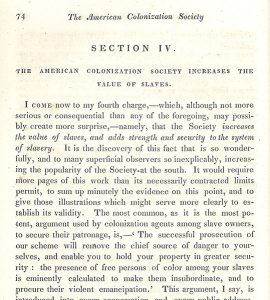
Schemes to settle free(d) blacks in Africa began in the early 19th century. They were advanced by groups with very different ideas about the morality of slavery, and thus different motives for supporting the colonization movement. The common thread was a belief that it would be hard for free people to share a society with those that enslaved them.
The earliest attempts to repatriate free and freed black Americans to Africa was in 1815 in Sierra Leone, although this largely unsuccessful venture was mostly focused on blacks from the United Kingdom. The slightly later colony of Liberia, founded in 1820 and declaring independence in 1847, is now a country of more than 4 million people.
Annual Report of the American Society for Colonizing the Free People of Colour of the United States. Washington, D.C.: Davis & Forces, n.d. [Rare Book Collection E448 .A51]
Carey, Mathew. Letters on The Colonization Society: with a View of Its Probable Results, Under the Following Heads: the Origin of the Society: Increase of the Coloured Population: Manumission of Slaves in This Country: Declarations of Legislatures, and Other Assembled Bodies, in Favour of the Society: Situation of the Colonists at Monrovia, and Other Towns . Addressed to the Hon. Charles F. Mercer. Philadelphia: E. G. Dorsey, 1838. [Rare Book Collection E448 .C27 1838x]
Freeman, Frederick. Yaradee: A Plea for Africa, in Familiar Conversations on the Subject of Slavery and Colonization. Philadelphia: J. Whetham, 1836. [Rare Book Collection E448 .F85]
Fuller, Richard. Address Before the American Colonization Society, Delivered at Washington, D.C., January 21, 1851. Baltimore: Office of True Union, 1851. [Rare Book Collection E448 .F96 1851]
Garrison, William Lloyd. Thoughts on African Colonization: or An Impartial Exhibition of the Doctrines, Principles and Purposes of the American Colonization Society. Boston: Garrison & Knapp, 1832. [Rare Book Collection E448 .G24 1832x]
Historical Notes on Slavery and Colonization: with Particular Reference to the Efforts Which Have Been Made in Favor of African Colonization in New-Jersey. Elizabethtown, N.J.: E. Sanderson, 1842. [Wade Hall Book Collection E449 .W628 1843x]
McDonough, John. Some Interesting Papers of John Mcdonogh, Chiefly Concerning the Louisiana Purchase and the Liberian Colonization, Ed. by James T. Edwards . McDonough, Md.: McDonough School, 1898. [Rare Book Collection F374 .M3x]
McKinley, Carlyle. An Appeal to Pharaoh: the Negro Problem, and Its Radical Solution. New York: Fords, Howard & Hulbert, 1890. [Rare Book Collection E185.61 .M15 1890x]
A Northman South: Or, The Race Problem in America Cincinnati, Ohio: J. Hill, 1890. [Rare Book Collection E185.61 .H646 1890]
Payne, John. Address Delivered Before the Alumni of the Protestant Episcopal Theological Seminary, Near Alexandria, Virginia, July 10, 1851, by John Payne, Missionary Bishop at Cape Palmas, Africa. Washington, D.C.: J. T. Towers, 1851. [Rare Book Collection BV2075 .P3 1851]
Spring, Gardiner. Memoirs of the Rev. Samuel J. Mills, Late Missionary to the South Western Section of the United States, and Agent of the American Colonization Society, Deputed to Explore the Coast of Africa. New York: J. Seymour, 1820.
8. Fugitive Slaves
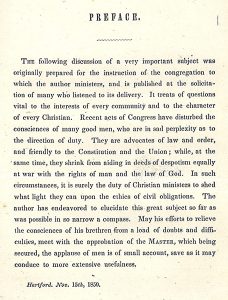
The earliest federal law requiring fugitive slaves to be returned to their owners was the Fugitive Slave Act of 1793. It was frequently mitigated by state and local laws, including personal liberty laws, and by the U.S. Supreme Court ruling in Prigg v. Pennsylvania in 1842, which held that states did not have to assist in the recapture of slaves.
The Fugitive Slave Act of 1850 returned the power to regulate fugitive slave law to the federal government. Enacted as part of the Compromise of 1850, it required government agencies and citizens of even Free States to return escaped slaves to their masters or face fines and other penalties. Though further personal liberty laws sought to counteract this, from 1850 onward it was much more dangerous for fugitive slaves if they were caught, even in the North.
Bledsoe, Albert Taylor. An Essay on Liberty and Slavery. Philadelphia: J. B. Lippincott & Co., 1856. [Rare Book Collection E449 .B646]
Giddings, Joshua R. The Exiles of Florida: Or, the Crimes Committed by Our Government Against the Maroons, Who Fled from South Carolina and the Other Slave States, Seeking Protection Under Spanish Laws. Columbus, Ohio: Follet, Foster, 1858. [Rare Book Collection E83.817 .G46 1858x]
Patton, William Weston. Conscience and Law; Or, a Discussion of Our Comparative Responsibility to Human and Divine Government: with An Application to the Fugitive Slave Law. New York: M. H. Newman & Co., 1850. [Rare Book Collection E450 .P32 1850]
Phillips, Wendell. Argument of Wendell Phillips, Esq., Against the Repeal of the Personal Liberty Law, Before the Committee of the Legislature, Tuesday, January 29, 1861. Boston: R.F. Wallcut, 1861. [Rare Book Collection E450 .P551 1861]
Shorter, Eli Sims. Speech of Hon. Eli Shorter, of Alabama, on the Massachusetts Personal Liberty Bill and the Constitutional Rights of the South. Washington, D.C.: 1861. [Rucker Agee Collection E450 .S5 1856x]
Spencer, Ichabod S. Fugitive Slave Law: The Religious Duty of Obedience to Law: A Sermon Preached in the Second Presbyterian Church in Brooklyn, Nov. 24, 1850. New York: M. W. Dodd, 1850. [Rare Book Collection E450 .S745]
9. Emancipation
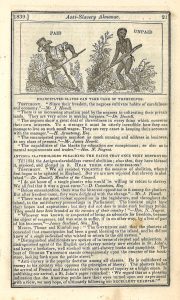
Discussions of the probable consequences of emancipation often fed into anti-abolition arguments. Reflections on actual emancipation in the Caribbean, following abolition efforts in the European colonial sphere, were also part of the discourse about ex-slaves and abolition in the U.S., providing examples both positive and negative.
Cochin, Augustin. The Results of Emancipation. Translated by Mary L. Booth. Boston: Walker, Wise, and company, 1863. [Rare Book Collection HT1031 .C65 1863b]
Cooper, Peter. Letter of Peter Cooper on Slave Emancipation. Loyal Publication Society pamphlet no. 23. New York: W. C. Bryant & Co., 1863. [Rare Book Collection E463 .L96 no.1-44]
Cox, Samuel Sullivan. Union-Disunion-Reunion: Three Decades of Federal Legislation, 1855 to 1885: Personal and Historical Memories of Events Preceding, During and Since the American Civil War, Involving Slavery and Secession, Emancipation and Reconstruction, with Sketches of Prominent Actors During These Periods. Providence, R.I., J.A. and R. A. Reid, 1885. [Wade Hall Book Collection E661 .C882 1885]
Emerson, Ralph Waldo. An Address Delivered in the Court-house in Concord, Massachusetts, on 1st August, 1844: On the Anniversary of the Emancipation of the Negroes in the British West Indies. Boston: James Munroe & Co., 1844. [Rare Book Collection E449 .E54 1844]
McKaye, James. 1864. The Mastership and Its Fruits: The Emancipated Slave Face to Face with His Old Master. New York: Loyal Publication Society. [Rare Book Collection E463 .L96 no. 45-78]
Owen, Robert Dale. Emancipation Is Peace. Loyal Publication Society pamphlet no. 22. New York: Loyal Society of New York, 1863. [Rare Book Collection E463 .L96 no.1-44]
Thome, James A., and J. Horace Kimball. Emancipation in the West Indies; A Six Months’ Tour in Antigua, Barbadoes, and Jamaica in the Year 1837. New York: American Anti-Slavery Society, 1838. [Rare Book Collection HT1093 .T395 1838ax ]
10. Freedmen
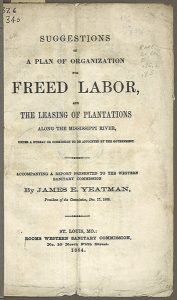
Though the majority of Northern states had enacted laws to abolish slavery before the Civil War, freedom did not come for enslaved people in Southern states until the Emancipation Proclamation, in 1863. This was a wartime measure, enforceable only in the rebellious southern states, and it did not abolish slavery or grant citizenship to former slaves. That was accomplished via the Thirteenth (1865) and Fourteenth (1868) Amendments. The formerly enslaved were supported by the Freedman’s Bureau and other federal aid.
Banks, Nathaniel Prentiss. Emancipated Labor in Louisiana. New York: n.p., 1864. [Rare Book Collection E185.93.L6 B2]
McKee, Samuel. Speech on the Freedmen’s Bureau Bill: Delivered in the House of Representatives, February 5, 1866. Washington, D.C.: Congressional Globe Office, 1866. [Rare Book Collection E185.2 .M3x]
Mitchell, Anne Mary. The Freed Boy in Alabama. Philadelphia: Presbyterian Publication Committee, 1869. [Alabama Collection E185.93.A3 M5 1869x]
Trumbull, Lyman. Speech of Hon. Lyman Trumbull, of Illinois, on the Freedmen’s Bureau [Veto Message; Delivered in the Senate of the United States, February 20, 1866. Washington, D.C.: Chronicle Book and Job, 1866. [Rare Book Collection E185.2 .T86 1866]
Vaughan, Walter Raleigh. Vaughan’s “Freedmen’s Pension Bill.” Being An Appeal in Behalf of Men Released from Slavery. A Plea for American Freemen and a Rational Proposition to Grant Pensions to Persons of Color Emancipated from Slavery. Omaha, Neb.: n.p., 1890. [Rare Book Collection E185.2 .V37]
Waterbury, M. Seven Years Among The Freedmen. Chicago: T. B. Arnold, 1890. [Alabama Collection E185.2 .W33 1890x]
Willey, Nathan. Education of the Colored Population of Louisiana. New York: Harper & Bros., 1866. [Rare Book Collection E185.93.L6 W55 1866x]
Yeatman, James E. Suggestions of a Plan of Organization for Freed Labor, and the Leasing of Plantations Along the Mississippi River, Under a Bureau or Commission to Be Appointed by the Government. Accompanying a Report Presented to the Western Sanitary Commission by James E. Yeatman, President of the Commission, Dec. 17, 1863. St. Louis, Mo.: Western Sanitary Commission, 1864. [Rare Book Collection E185.2 .Y5]
